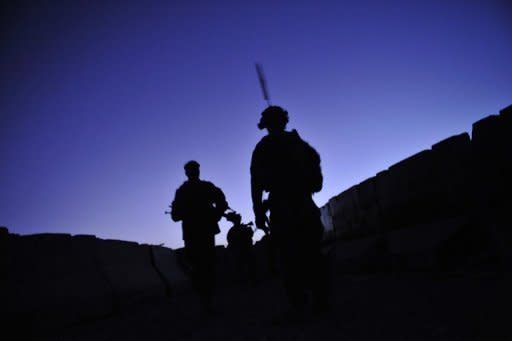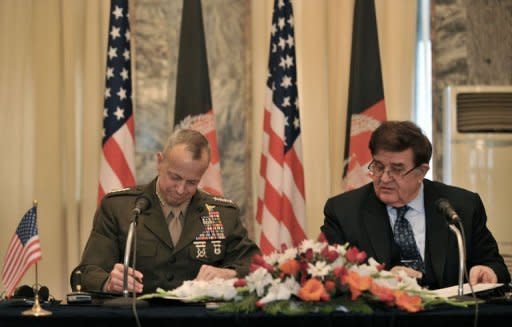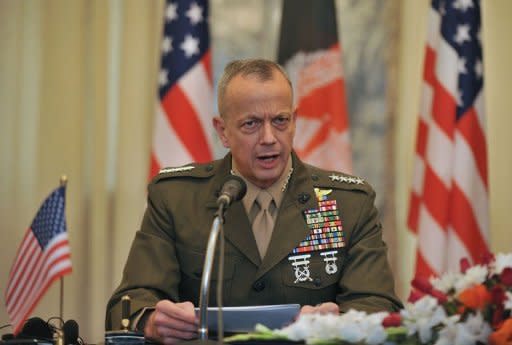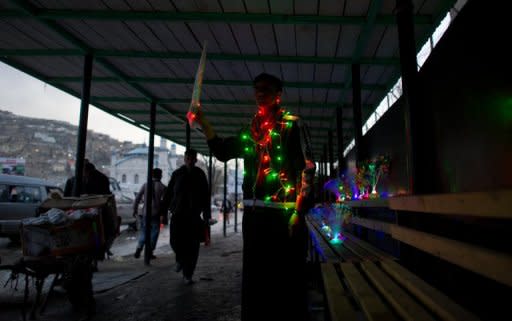US gives Afghans control in deal on night raids
Afghanistan and the United States signed a deal on special forces operations in the insurgency-wracked country on Sunday, putting Afghans in charge of controversial night raids. Night operations by international special forces against insurgent hideouts have triggered popular anger and been a key factor fraying Washington and Kabul's relationship, with Afghan President Hamid Karzai denouncing them as reckless. But Western military commanders stress they are extremely useful in the bloody war against Taliban insurgents, who have been fighting Karzai and his Western allies for more than a decade. The deal, covering all special operations in Afghanistan, is expected to pave the way for a strategic partnership pact between Washington and Kabul on the US presence beyond 2014, when most of the 130,000 NATO-led troops are due to leave. It goes into effect immediately. The text gives Kabul authority over special forces operations, creating an Operational Coordination Group of Afghan security and law enforcement personnel that "reviews and approves" such missions, including night raids. "This is a paradigm shift in the way special operations are being conducted," said a US official involved in the negotiations. "They (the Afghans) have the initial say... they are the ones who are deciding to conduct an operation." The document states that Afghan special operations forces will lead the missions and only Afghan forces should search private homes and compounds, although they can have "support from US forces... as required or requested." Pentagon spokesman George Little hailed the agreement as a "major step forward," saying in a tweet that the pact "marks progress in transition process and in Afghan capabilities." Analysts said the agreement appeared to be a good one for Kabul, but warned that it might not reduce abuses -- although it would make them less of a strain between the two allies. At a signature ceremony in the Afghan capital, Defence Minister Abdul Rahim Wardak described it as "a fundamental step towards Afghan national sovereignty." General John Allen, the US commander of NATO-led forces, called it the "second important milestone in less than 30 days towards Afghan sovereignty", after an agreement transferring control of detainees to Afghan authorities. Karzai's spokesman Aimal Faizi told AFP that warrants for night raids would have to be issued by Afghan legal authorities, and Kabul would have control over captured prisoners. In their supporting role, foreign forces could provide "intelligence sharing... air support or other modern technology," he said. "Afghans will determine whether there is a need for the foreigners to take part." One man who said his house in Sha Wali Kot in Kandahar province, a Taliban stronghold, was raided by US forces and his brother killed some months ago welcomed the agreement. "They tied our hands in front of our women and beat us, that was a dishonour in front of our women," said Haji Marjan, 54. "Afghans know the culture, they will coordinate their operations with people. We are happy about it." But Kate Clark, of the Afghanistan Analysts Network, said: "It doesn't mean Afghans on the receiving end of night raids won't be on the receiving end of abuses. "It might mean it's politically less sensitive -- it's a fact that both Afghans and foreign journalists care more when foreigners harm Afghans rather than Afghans harm Afghans," she added. The possibility of detention without trial was written into the document, she pointed out, describing it as "very worrying." But she said the agreement "looks like a good deal" for the Kabul government. "The Afghan government has managed to get back some sovereignty," which was "very important" to Karzai. "The palace gets delegations of very upset people" complaining about the operations, Clark said. Tensions between Kabul and Washington have soared this year, with incidents including the burning of Korans at a US military base and a massacre of 17 civilians, for which a US soldier has been charged. But US officials hope the new agreement will pave the way for a strategic partnership agreement governing relations between Kabul and Washington after 2014, which they want to have signed in time for a NATO summit in May in Chicago. US military officers envisage a follow-on force of around 15,000 personnel in Afghanistan, focusing on air power, logistics, training, intelligence and counterterrorism. Allen told the Senate Armed Services Committee last month that 2,200 night raids were carried out last year. In 90 percent of the operations, no shots were fired and civilian casualties rarely occurred, he said.





